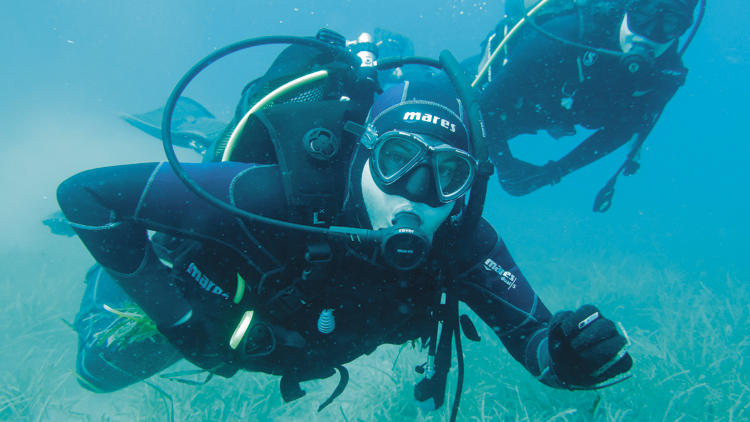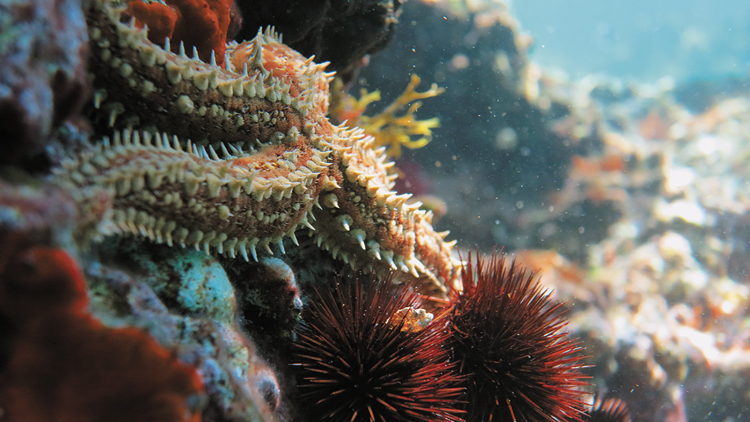Polaganjem vijenaca, paljenjem svijeća i odavanjem počasti u zagrebačkoj je vojarni "Croatia" 5. studenog obilježena…
4th Guards Brigade veteran diver club
 Within the environmental programme “Ozone Faces” within the international campaign “Ozone Heroes”a clean-up campaign co-organised by the 4th Guards Brigade Veteran Diver Club and the association “the Compass of Murter” was held on a beach (Podvrške”) in the island of Murter on 27 June. Tourists and visitors of Murter observed the activities on the beach Podvrške on 27 June 2020 as part of the environmental awareness programme, education and research of the condition of the seabed at the location. A workshop for children and adults, with an objective to reveal the highlight the importance of ozone and of its protection the importance of its protection, was led by Ljiljana Zmijanović, a researcher from Šibenik, an ecologist, a veteran of the Homeland War and an associate member of the 4th Guards Brigade Diver Club, during which children made reliefs and sculptures in the sand and gravel. They were joined by the members of the 4th Guards Brigade Veterans Diver Club, an association gathering members of the 4th Guards Brigade, defenders from the Homeland War, their family members and other interested persons. As many as 13 of them, fully equipped with scuba gear, headed towards Murter to explore the seabed to look for the Adriatic pen shell.
Within the environmental programme “Ozone Faces” within the international campaign “Ozone Heroes”a clean-up campaign co-organised by the 4th Guards Brigade Veteran Diver Club and the association “the Compass of Murter” was held on a beach (Podvrške”) in the island of Murter on 27 June. Tourists and visitors of Murter observed the activities on the beach Podvrške on 27 June 2020 as part of the environmental awareness programme, education and research of the condition of the seabed at the location. A workshop for children and adults, with an objective to reveal the highlight the importance of ozone and of its protection the importance of its protection, was led by Ljiljana Zmijanović, a researcher from Šibenik, an ecologist, a veteran of the Homeland War and an associate member of the 4th Guards Brigade Diver Club, during which children made reliefs and sculptures in the sand and gravel. They were joined by the members of the 4th Guards Brigade Veterans Diver Club, an association gathering members of the 4th Guards Brigade, defenders from the Homeland War, their family members and other interested persons. As many as 13 of them, fully equipped with scuba gear, headed towards Murter to explore the seabed to look for the Adriatic pen shell.
Ćiro Ugrin, Captain (Ret.), Chairman of the 4th Guards Brigade Veterans Divers Club: The project is intended to promote environment and healthy living, and our diver club gladly takes part any time. Our assignment is to check and record the situation of the seabed and of the underwater life, and to shoot the pen shells as well. The best underwater filter-feeders, pen shells are jeopardised by an unknown bacterion, and we are about to explore the situation here. The divers divided into two groups, equipped with two underwater cameras, resurfaced after a 2-hour search. The result of the search was not good.
Stop the pollution
Ćiro Ugrin explains: “The seabed is not in a good condition. This area is a pen shell habitat, but we only found large waste instead, at the depth of 17-18 m, which is a rarity. In towns the waste is found at minor depths – up to 10 m, and the waste we spotted on the seabed here was thrown directly from the moored boats. We did not see any household appliances, or bulky waste such as car tyres, but bottles, plastic ware and other waste from the boats. Our conclusion was that the local authorities and the tourist board need to adopt a boat reception, control and fining strategy. The port authorities and other institutions can do much to prevent further pollution. Throughout the search we saw 3-4 fish, which should be found here thanks to the underwater configuration and vegetation”. Fortunately, more and more people show concern for the situation of the sea and the underwater environment and take action continuously to protect them, the 4th Guards Brigade Diver Club included, whose annual working plan and campaigns feature regular joint activities with the local community and tourist boards. Ecology is one of the Club’s main tasks, and diving is their way of showing patriotism.

Regular environment protection activities
The 4th Guards Brigade Veterans Diver Club annual working plan features regular environment protection activities run with the local community and the tourist boards. They are often invited to take part and accept it gladly anytime they can.Croatian defenders in the 1990ies have now become divers, “armed” with divers mask and cylinders, but their mission is the same – the defenders keep defending and protecting their beloved homeland.”Environment protection is one of main tasks of our diver club and we are motivated for it. Former defenders, veterans of the 4th Guards Brigade, children and youth all attach great importance to ecology, the Croatian sea, health, and protection and of the Adriatic”, says Ćiro Ugrin, Captain (Ret.) and Chairman of the 4th Guards Brigade Veterans Diver Club
Protecting the ozone layer
The international campaign “Ozone Heroes”, comprising numerous ecologic awareness actions and campaigns each year, was launched pursuant to the Montreal Protocol on Substances that Deplete the Ozone Layer, which helped the ozone hole in Antarctica gradually heal. The Montreal Protocol is an international agreement from 1987, designed to encourage the developed countries to phase out production of ozone-depleting substances, and an example of excellent international co-operation, and one of the most productive successful agreements of the kind and the first universally ratified agreement in the history of the United Nations. The goal of the campaign activities is protection of the ozone layer and of the climate, and activities phasing down hydrofluorocarbons responsible for the global warming and for the occurrence of climate extremes and harmful changes.
